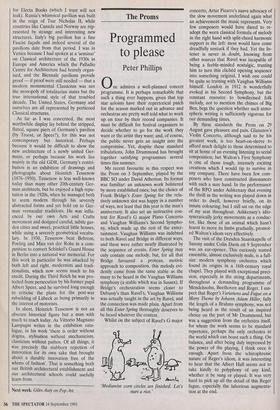The Proms
Programmed to please
Peter Phillips
programme. It is perhaps remarkable that such a thing ever happens, given that top star soloists have their repertorical patch for the season marked out in advance and orchestras are pretty well told what to work up on tour by their record companies. It must be difficult for festival organisers to decide whether to go for the work they want or the artist they want; and, of course, the public never gets an insight into the compromise. Yet, despite these standard tribulations, John Drummond has brought together satisfying programmes several times this summer. programme. It is perhaps remarkable that such a thing ever happens, given that top star soloists have their repertorical patch for the season marked out in advance and orchestras are pretty well told what to work up on tour by their record companies. It must be difficult for festival organisers to decide whether to go for the work they want or the artist they want; and, of course, the public never gets an insight into the compromise. Yet, despite these standard tribulations, John Drummond has brought together satisfying programmes several times this summer.
My recent favourite in this respect was the Prom on 3 September, played by the BBC SO under David Atherton. Its format was familiar: an unknown work bolstered by more established ones; but the choice of Frank Bridge's Enter Spring for the rela- tively unknown slot was happy in a number of ways, not least that this year is the man's anniversary. It also set an instructive con- text for Ravel's G major Piano Concerto and Vaughan Williams's Second Sympho- ny, which made up the rest of the enter- tainment. Vaughan Williams was indebted to both Ravel and Bridge in different ways, and these were rather neatly illustrated by the sequence of events. Enter Spring may only contain one melody, but, for all that Bridge favoured a protean, motivic approach to composition, this melody evi- dently came from the same stable as the many to be heard in the Vaughan Williams symphony (a stable which was in Sussex). If Bridge's orchestration seems closer to Debussy's than Ravel's, Vaughan Williams was actually taught in the art by Ravel, and the connection was made plain. Apart from all this Enter Spring thoroughly deserves to be heard whatever the context.
Whilst on the subject of Ravel's G major Mediawise corn circles are finished. Let's start a riot.' concerto, Artur Pizarro's suave advocacy of the slow movement underlined again what an achievement the music represents. Very few composers would have dared to re- adopt the worn classical formula of melody in the right hand with split-chord harmonic support in the left: most would have come dreadfully unstuck if they had. Yet the lis- tener is never in doubt, knowing from other sources that Ravel was incapable of being a feeble-minded nostalgic, trusting him to turn this cliched opening sequence into something original. I wish one could be quite so trusting with Vaughan Williams himself. London in 1912 is wonderfully evoked in his Second Symphony, but the constant resource to bowdlerised folk melody, not to mention the chimes of Big Ben, begs the question whether such atmo- spheric writing is sufficiently vigorous for our demanding times.
By these standards the Prom on 29 August gave pleasure and pain. Glazunov's Violin Concerto, although said to be his greatest work, is too heart-on-sleeve to afford much delight to those determined to sit at home of an evening listening to serial composition; but Walton's First Symphony is one of those tough, intensely exciting creations which I would tip to survive in any company. There have been few com- posers who have constructed dissonances with such a sure hand. In the performance of the RPO under Ashkenazy that evening the thrill in the writing was played down in order to dwell, however briefly, on its innate colouring; but I still sat on the edge of my seat throughout. Ashkenazy's idio- syncratically jerky movements as a conduc- tor, like those of an animal which hasn't learnt to move its limbs gradually, promot- ed Walton's idiom very effectively.
The visit of the Dresden Staatskapelle of Saxony under Colin Davis on 9 September was an ear-opener. This curiously named ensemble, almost exclusively male, is a full- size modern symphony orchestra which found its origins in a 16th-century royal chapel. They played with exceptional preci- sion, especially in the string departments, throughout a demanding programme of Mendelssohn, Beethoven and Reger. I sus- pect that Reger's Variations and Fugue on a Merry Theme by Johann Adam Hiller, fully the length of a Brahms symphony, was not being heard as the result of an inspired choice on the part of Mr Drummond, but was a suggestion from the orchestra itself, for whom the work seems to be standard repertoire, perhaps the only orchestra in the world which can boast such a thing. On balance, and after being duly impressed by the power of the playing, I think once is enough. Apart from the schizophrenic nature of Reger's idiom, it was interesting to hear that the Albert Hall seems not to take kindly to polyphony of any kind, whether it be sung or played. It was very hard to pick up all the detail of this Reger fugue, especially the laborious augmenta- tion at the end.


















































 Previous page
Previous page